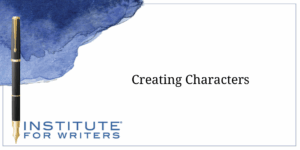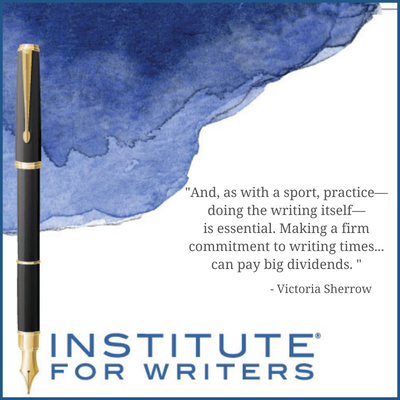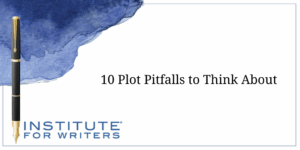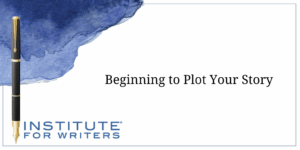
Creating Characters
Character development is an interesting part of writing but may be among the most time consuming and significant in your story.
Beginning Tuesday, July 22, 2025 at 10 PM CT through Wednesday, July 23, 2025 at 4 AM CT, we will be performing scheduled maintenance to update our website.

We teach our students how to write and get published!
View our Course Catalog >
If you’re a sports fan, you’ve probably watched TV interviews with athletes. Many of these interviews feature people who recently won an important event and/or have shown great improvement. When interviewers ask, “How did you do it?” the athletes often say that, besides making the most of their strengths, they strived to improve their weak areas. They set goals, practiced longer and harder, worked with trainers and coaches, studied the methods of successful competitors, and developed the mindset to focus, persevere, and believe they could succeed.
Sound familiar? As writers, we use similar approaches and can apply them to our “back-to-school” program. Ask yourself: What do I want to learn and improve during the coming “term?” Then design a personalized plan for studying, practicing skills, learning from experts, building your writing ‘muscles,’ and completing various learning units that will lead to your writing success.

Based on self-reflection and feedback, make a list. Your strong points might include realistic dialogue, colorful descriptions, dramatic scenes, good grammar, and/or creative ideas. Your “areas to improve” could include characterization, plotting, “showing” not telling, weak organization, wordiness, poor transitions, and/or sagging story “middles.” And what about your work habits?
If one of your goals is to become a more productive and disciplined writer, you might spend part of your “school week” learning to improve your work habits. Good books on this subject include Kristi Holl’s Writer’s First Aid and More Writer’s First Aid. They offer support and encouragement with practical tips on dealing with time pressures, “voices of self-sabotage,” procrastination, fear of failure, and much more. Anne Lamott’s Bird by Bird has guided many writers. If you’re feeling discouraged, The Writer’s Book of Hope by Ralph Keyes can be another good resource.
And, as with a sport, practice—doing the writing itself—is essential. Making a firm commitment to writing times, as you would in a school setting, can pay big dividends. The basketball player and coach Ed Macauley once said, “When you are not practicing, remember, someone somewhere is practicing, and when you meet him, he will win.”
Through your reading and writing experience, you might know what you need to learn. Fiction writers might study character development, plotting techniques, world building, or dialogue, to name a few. “How-to” books on these subjects abound—far too many to list here. I’ve learned a lot from Nancy Kress’s books Beginnings, Middles & Ends and Characters, Emotion & Viewpoint, as well as James Scott Bell’s book Conflict & Suspense. Many writers recommend books in the Save the Cat series.
Nonfiction writers might study narrative techniques, tips for interviewing people, or research methods, as well as skills for writing success in specific types of nonfiction, e. g. biography, memoir, cookbook, inspirational, humor, science, or history. Two good references are Writing Creative Nonfiction by Philip Gerard and Telling True Stories, edited by Mark Kramer.
If you haven’t done much writing and don’t know where to begin, an organized writing course can cover basic techniques and show you a path forward. For example, IFW courses move along step-by-step as students learn and practice writing skills, using a core curriculum, with additional readings and resources that address a student’s specific needs.
Perhaps you’re an advanced writer looking to raise your skills to higher levels? Coursework in this area could focus on ways to develop your distinctive writing style and voice, add layers of meaning, improve the pacing, weave themes into a story, and use literary devices more effectively. You can find many books on such topics, including two on my shelves: Beyond Style: Mastering the Finer Points of Writing by Gary Provost, and Revision Power by Cindy Rogers. Suppose you are reading about metaphors? Build on this by looking for examples of metaphors in published works. Try using a metaphor to enhance your own writing.
If you are ready to revise a completed manuscript, design a “course” to accomplish that task. One of my friends started the process by attending a one-day workshop on revisions. Each week, she spent time reading about revision techniques, including Claire Kehrwald Cook’s book Line by Line. She used what she was learning while working on a second, and then a third, draft. After four months, she was ready to submit her manuscript.
Clearly, writers can learn by reading the works of good writers. Need suggestions? The Thinkingwest.com website is one resource. You can find many lists that claim to identify the “best” books in a category—for instance, mysteries, historical fiction, biographies, memoirs, regional, etc. Do you like a certain writer’s style? Plan to read many, even all, of that author’s works. I’ve immersed myself in the works of numerous authors, focusing on each author for one month or more, and it has helped my writing and my teaching.
Consider your writing interests and goals as you make your reading list. Think about how many hours you can devote to reading each week or month. Now you will read with a critical eye, studying the authors’ techniques. Analyze the writing style, noting how each writer uses language, put sentences together, writes dialogue, or presents a subject. In her book Reading Like a Writer, Francine Prose looks at old masters of fiction (e.g. Dickens, Austen, and Chekhov) and newer ones (including Katherine Mansfield, John Le Carre, and Isaac Babel), to examine structure, narration, character, dialogue, style, and other elements.
Ready for a new learning adventure? Create your curriculum. Set times and one or more places for your classes. Plan to do the readings, writing, and “homework” you need to progress. Stick to your plan and plan to see your writing success. Get back to school!
Victoria Sherrow loves to learn and strives to become a better writer and a better teacher each year. She has published short stories, articles, and books (fiction and nonfiction) for readers aged preschool through adult. Her books have received starred reviews and been honored by the American Library Association, Parents Choice Gold Award, National Association for the Advancement of Science, and NYPL Best Books for the Teenage, among others. Victoria has taught writing for more than 25 years and has also been an assistant editor and writing contest judge. She says, “One of the joys of writing is that we can learn something new with everything we write.”

Character development is an interesting part of writing but may be among the most time consuming and significant in your story.

Plot can be tricky, and, as a writer, you need to be aware of what makes or breaks plot. Take a look at 10 different things to avoid in your own writing.

Plot is more than just the chain of events within a story. There are so many elements to plot to consider when writing. Let’s dive into those elements.
1000 N. West Street #1200, Wilmington, DE 19801
© 2024 Direct Learning Systems, Inc. All rights reserved.
1000 N. West Street #1200, Wilmington, DE 19801
© 2025 Direct Learning Systems, Inc. All rights reserved.
1000 N. West Street #1200, Wilmington, DE 19801
©2025 Direct Learning Systems, Inc. All rights reserved. Privacy Policy.